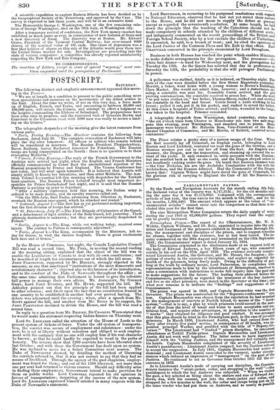In the House of Commons, last night, the Canada Legislative
Council Bill was read a second time. Mr. PEEL, in moving the second reading at the morning sitting, explained that the object of the bill was to enable the Legislature of Canada to deal with its own constitution; and he described at length the circumstances out of which the bill arose. Sir Jomv PAKINGTON, supported by Mr. HENLEY, strongly objected to the measure, as one that sanctioned 'institutions of the most democratic and revolutionary character " ; objected also to the lateness of its introduction, and to the conduct of the Duke of Newcastle throughout the affair ; at the same time admitting that Parliament is bound to give the colonists full power to manage their own affairs. Mr. ADDERLEY, Sir GEORGE GREY, Lord Jona/ RUSSELL, and Mr. HUME, supported the bill. Mr. Adderley pointed out that the principle of the bill had been applied to other colonies ; and dwelt upon the fact that no constitution framed in one country to be established in another had ever proved lasting. The debate was adjourned until the evening ; when, after a speech from Mr. Soon against the bill, and another from Mr. Moos in its support, Sir JOHN PARINGTON declined to divide the House, and the bill was read a second time.
In reply to a question from Mr. BRIGHT, Sir CHARLES Woon stated that be would make hi statement respecting Indian finance on Thursday next.
Lord Sr. LEONARDS called the attention of the House of Lords to the present system of tickets-of-leave. Under the old system of transporta- tion, the convict was secure of employment and subsistence : under the new, he is set at liberty without resources and obliged to seek employ- ment with the certainty that no one will employ him if his real character be known ; so that he could hardly be expected to tread in the paths of honesty. The returns show that 1200 convicts have been liberated since last October ; and with these the Government has dealt upon no system. He was inclined to move for a Select Committee next session. The Duke of NEWCASTLE showed, by detailing the method of liberating the convicts referred to, that it was not correct to say that they had no means of livelihood. Through the agency of the gaol chaplains, employ- ment was found for them ; and out of the 1200 liberated, not more than one per cent had returned to vicious courses. Should any difficulty arise in finding them employment, Government intend to make provision for them on public works. Lord CAMPBELL repeated his old opinions in favour of transportation ; despairing of the success of the new system. Lord Sr. LEONARDS expressed himself satisfied in many respects with the Duke of Newcastle's statement. Lord BROUGHAM, in recurring to his postponed resolutions with regrfl to National Education, observed that he had not yet stated their nature to the House, and he did not mean to supply the defect at present except as regarded the seventeenth resolution. At some length, he laid down the principle that the teaching of the Catechism should not be made compulsory in schools attended by the children of different sects; and indignantly commented on the recent proceedings of the British and Foreign School Society, who by a test exclude the children of Unitarians, It amounted, he said, to a breach of trust; and he cited the opinions of the Lord Justice of the Common Pleas and Mr. Bolt to that effect Earl GRANVILLE concurred in the principle enunciated by Lord Brougham.
Business in both Houses has reached the point which enables Ministers to make definite arrangements for the prorogation. The precursor—the white bait dinner—is fixed for Wednesday next, and the prorogation for Tuesday the 15th. As the Queen has selected that day in preference to Saturday the 121.11, the probability is that she will prorogue Parliament in person.


























 Previous page
Previous page